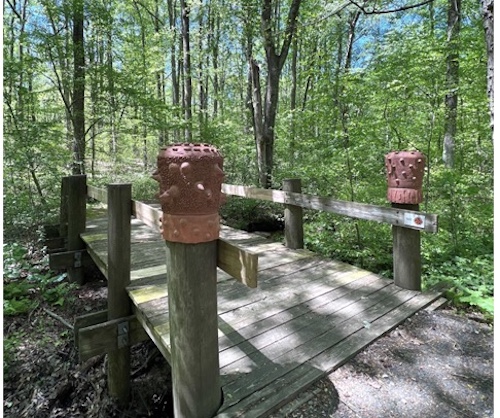In a lively mix of nature and art, artists from the Mid-Atlantic region have created a wide range of site-specific sculptures for Adkins Arboretum’s 12th biennial Outdoor Sculpture Invitational, Artists in Dialogue with Landscape, on view through September 30. There will be a reception and guided sculpture walk with the artists on Saturday, June 21, from 2:00 to 4:00 pm.
The show begins with a pair of teardrop-shaped palm husks hanging from the limb of a pine outside the Visitor’s Center. One is a natural cinnamon-brown, the other is painted with colorful, abstracted flowers and leaves. Both are beautiful and eye-catching, raising thoughts about how human-made beauty compares with nature’s.
Created in collaboration by Ceci Cole McInturff of Alexandria, VA and New York painter Antoinette Wysocki, more of these palm husks dangle and spin among the forest trees. Just down the creekside path is another collaboration, this one by McInturff and Washington artist Chris Combs. Titled “Creature/Machine,” all of its palm husks are natural except for one where a tangle of wires and electronics is tucked inside. A solar-powered simulation of single-cellular life, it’s a tongue-in-cheek musing on whether it’s better to live as a creature or a machine.
In another mischievous look at technology’s relationship with nature, Combs created a solar-powered sculpture that counts units of time with LED lights flashing at intervals from 1 second up to 68 years. In sharp contrast is “Neverneverland (A Sundial)” by Stephanie Garon of Urbana, MD. With solar-powered technology dating back to ancient Egypt and Babylon, this analemmatic sundial uses the visitor’s own shadow to make the relationship of sun and earth visible.
Playing with changing light and shadow, opacity and transparency, “Filter,” by Alexandria artist Marcos Smyth, uses pieces of burlap loosely stretched between the branches of young trees like sails or tent caterpillar webs to capture the ever-changing beauty of the forest.
The forest’s beauty and its vulnerability led Melissa Burley of Laurel, MD to create several hollow concrete balls planted with saplings, ferns, and varicolored moss. Like tiny planets or ecosystems, they call to mind the accelerating loss of natural landscapes to development, yet inspired by her memory of a weeping willow sprouting through the cracks in an asphalt parking lot, they also prove the tenacious drive of life to grow even under difficult circumstances.
Arlington artist Isabella Whitfield’s “Ringside” evokes this urge with its thousands of sweetgum balls laboriously collected throughout the forest to fill a ten-foot disk spreading under the trees. While a single seedpod might seem insignificant, the sheer quantity she gathered speaks volumes about the fertility and abundance of life in the forest. Also captivated by these spiny balls, Nada Romanos Abizaid of McLean, VA turned one of the forest’s small wooden bridges into a magical portal by crowning two of its pilings with a pair of ceramic sculptures covered with oversized knobs and spiky protuberances inspired by sweetgum balls.
Likewise fascinated by the potential of seedpods, as well as sprouting plants and flowers, Falls Church, VA artist Marc Robarge created a compelling series of small ceramic sculptures as finely detailed as pine cones or budding flowers. So animated that they almost seem like tiny animals, their ambiguous character blurs the distinction between what is human made and what is natural to the forest. Both Elizabeth McCue of Yardley, PA and Bridgette Guerzon Mills of Towson, MD focused on the mycorrhizal network, an underground symbiotic network of fungi and plant roots that allows trees to communicate and share resources. The spidery white lines of Mills’s plaster-covered wire interwoven with crocheted thread evoke the mycorrhizal fibers hidden underground throughout the forest. McCue’s colorful web of branches stretching from a large “Mother Tree” to a nearby tree injured long ago by logging or an accident tell of how trees are able to help sustain one another through this network. Interconnected and interdependent, they are an integral part of the forest’s ecology.
This show is part of Adkins Arboretum’s ongoing exhibition series of work on natural themes by regional artists. It is on view June 1 through September 30 at the Arboretum Visitor’s Center located at 12610 Eveland Road near Tuckahoe State Park in Ridgely.
For gallery hours or more information, contact Adkins Arboretum at 410-634-2847, or visit adkinsarboretum.org.
A 400-acre native garden and preserve, Adkins Arboretum provides exceptional experiences in nature to promote environmental stewardship.



Write a Letter to the Editor on this Article
We encourage readers to offer their point of view on this article by submitting the following form. Editing is sometimes necessary and is done at the discretion of the editorial staff.